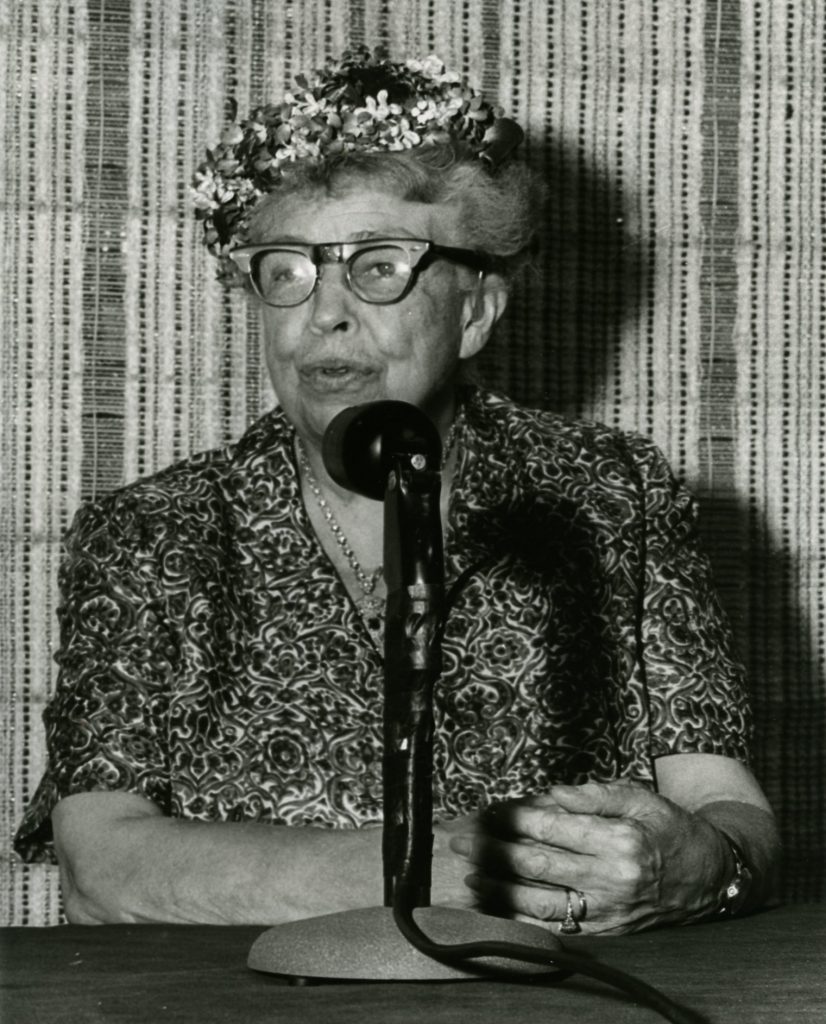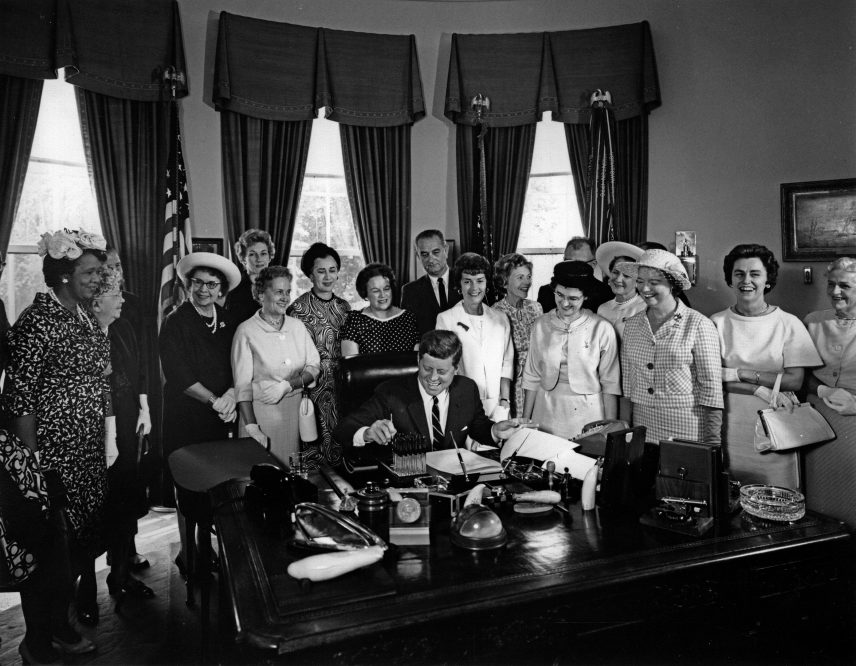Eleanor Roosevelt & AAUW
Against Apathy
It is today that we must create the world of the future. Never have we needed as acutely as now — in a world of ferment, shifting and changing its course, often without direction — the full use of all the brain power we have. We need every single mind. We cannot afford to have any potential talent or ability dulled to apathy.

AAUW is proud to have called Eleanor Roosevelt a member, supporter and friend.
She joined the organization in 1929, when she was First Lady of New York, and spoke to the AAUW New York City (NY) Branch that year on Armistice Day, with the New York Times noting that she “ha[d] just been elected to the membership in the AAUW.”
In her address, Roosevelt urged the members to do everything possible to make “another war impossible.” She continued, “The only real safeguard is what education can do to change the hearts of men, and I think that has to be done by women. I think that you are the women to do it.”
She attended many AAUW branch meetings around the country, from New York to Oak Ridge, Tennessee, many of which she chronicled in her syndicated My Day column, which is available online courtesy of the Eleanor Roosevelt Papers Project at George Washington University.
She was close friends with AAUW New York City (NY) Branch president Marion Dickerman and AAUW member Nancy Cook, and the three operated a business called Val-Kill Industries that employed local residents in furniture-making and handicrafts. Dickerman was also vice president and principal of Todhunter School, where Roosevelt also taught.
As first lady, Roosevelt held a number of White House press conferences exclusively for women reporters because they were usually barred from the president’s press conferences. In 1936, she invited Mary Ritter Beard, a historian and AAUW member, to speak about her efforts to write women back into history. This was on the same day that Beard saw her dream take shape — the World Center for Women’s Archives, a grand idea to collect and centralize the archival records of women’s contributions to our world, held its first planning meeting.
Later that evening, Roosevelt and Beard visited AAUW’s headquarters at 1634 Eye St. in Washington, D.C., and along with AAUW leaders they discussed the plan to gather historical materials relating to women. Roosevelt expressed surprise that women had not “tackled the writing of history in larger numbers than seemingly they have done” but applauded Beard’s efforts to gather the documents necessary to do so. Both women expressed dismay that major U.S. history books at that time failed to mention a single woman.

In 1959, she spoke at AAUW’s National Convention Kansas City, where she spoke about the United States’ position in the world during the Cold War era. She answered the question of why Americans should help developing areas of the world. According to Roosevelt, as leaders of the noncommunist world, Americans must understand the regions that have yet to be swayed to either democracy or communism. Americans needed a complete understanding of the native people, customs, and religions in order to better understand what democracy could offer to those nations.
In December 14, 1961, President John F. Kennedy appointed Roosevelt to chair the Presidential Commission on the Status of Women until her death on November 7, 1962.
Three additional AAUW members served on the 26-member commission: Rep. Edith Green (D-OR), Caroline Ware and Marguerite Rawalt. And Roosevelt also sent a letter to then-AAUW President Anna Rose Hawkes asking for AAUW to be represented on the commission’s Committee on Education. Pauline Tompkins, AAUW general director (1959-67) served on behalf of AAUW.
The commission investigated the social and economic conditions of women in America, and recommended prioritizing the acceptance of supporting more women in education and legislation to address the issues of workplace discrimination, maternity leave and equal pay. In 1963, President Kennedy signed the Equal Pay Act into law.

AAUW Eleanor Roosevelt Fund Award
In 1989, to help honor and recognize her legacy to the world and to AAUW, our organization created the Eleanor Roosevelt Fund Award, which was first presented at the AAUW National Convention in Washington, D.C. that year to support:
- Removing barriers to women’s and girls’ participation in education
- Promoting the value of diversity and cross-cultural communication
- Developing greater understanding of the ways women learn, think, work and play
The first Eleanor Roosevelt Fund Award honored Ruth Leger Sivard, economist and author of World Military and Social Expenditures and Women … a World Survey, which was first distributed in 1985 at the Decade for Women Conference Forum in Nairobi, Kenya.
Related
Barriers & Bias: The Status of Women in Leadership (2016)

AAUW’s story begins in 1881, when a small group of female college graduates banded together to open the doors for women’s career advancement and to encourage more women to pursue higher education.
